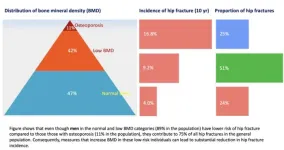(Press-News.org) AUGUSTA, Ga. (Sept. 1, 2023) – A nationwide assessment of Obstetrics and Gynecology residency programs reveals the need for more training in how to provide the best care for women going through menopause, according to investigators at the Medical College of Georgia.
“When you look at projections over the next few decades, by 2060, there will be around 90 million women in the US alone, who will be in the post-menopausal range,” says Jennifer Allen, MD, associate professor and director of the Obstetrics and Gynecology Residency Program at MCG and Wellstar MCG Health. “Yet it's a tiny fraction of the curriculum, if any at all, in most OB/Gyn residencies. Compare that to something like pregnancy. In 2020, there were about 3 million live births, but we teach about pregnancy every single day in residency training.”
This is not a new problem, Allen says, noting that she received very little menopause education during her own residency at MCG and Wellstar MCG Health. It was not until she began practicing that she realized the enormous need. She sought out additional training and became certified as a menopause practitioner from the North American Menopause Society — one of only four in Augusta and the surrounding area. She also created lectures that she offers to residents at MCG and Wellstar MCG Health, and she began having them spend time rotating through her menopause clinic. “Our curriculum really needed to be built up,” she says.
When Allen became director of the OB/Gyn Residency Program in 2020, she set out to do just that, in Augusta, and nationwide.
Allen recently surveyed 145 residency program directors across the country. Of the 99 who responded, almost all – 93% — strongly agreed that residents should have access to a standardized menopause curriculum, she recently reported in Menopause, the journal of the North American Menopause Society. Only 31% of programs reported having any menopause curriculum at all.
“A lot of program directors don’t actually practice a ton of menopause medicine themselves, so it is hard for them to figure out how to teach residents about it,” she says. “Unless you have a menopause expert or someone having a menopause clinic at your institution, that's a challenging thing to teach your learners. That is the basis for what I hope to do in the future, which is to help create a national curriculum.”
As a member of the Education Committee of the International Menopause Society Allen explains that there is a system in place for practicing providers called IMPART, short for International Menopause Society Professional Activity for Refresher Training, which features eight online training modules. “We are trying to modify and expand those modules to meet resident learner needs and that way we're not completely reinventing the wheel. I'm hopeful that this is going to finally move the needle in a forward direction.”
More menopause education could also be helpful to other types of physicians — primary care providers like family medicine physicians or internists, and even subspecialists like endocrinologists, for example, because their female patients could present with symptoms in their offices first.
Menopause symptoms are more than the signature hot flashes, Allen says. Women can experience symptoms from head to toe, including things like sleep disturbances, hair, nail and skin changes, bone loss, mood instability, depression and anxiety. And treatment options can include both hormone and non-hormonal therapy.
“When a physician is well informed about all of these things, then the patients get better counseling, they learn about safe options, and can make the best joint decision with their doctor about how to best manage their care,” she says. “Without menopause education for physicians, patients may get a response such as ‘Well, that’s just aging’ or ‘That’s menopause and you’ve just got to deal with it’. That’s not fair to our patients. They deserve better care, so that’s my goal — better training for physicians and ultimately improving patient care.”
Read the abstract here.
END
OB/Gyn residency programs should offer more menopause training
2023-09-01
ELSE PRESS RELEASES FROM THIS DATE:
Deprived teens with poor learning skills at greatest risk from email scams, says expert
2023-09-01
Disadvantaged teenagers are at greater risk of email scams and need better protection, according to an international study published in the peer-reviewed British Journal of Educational Studies.
Findings based on more than 170,000 students aged 15 show that one in five from low-income families or deprived areas could fall victim to phishing. This is much higher than the probability for the age group overall. Email scams leave people vulnerable to identity theft, putting young people at risk of financial fraud and having their savings stripped.
The most vulnerable are those who also have poor learning skills according to the data from 38 countries including ...
Metal organic framework nanosheets employed as ion carriers for self-optimized zinc anode
2023-09-01
Aqueous rechargeable zinc ion batteries are promising in electric grid storage due to their low cost and intrinsic safety. However, their practical implementation is hindered by poor reversibility of the zinc anode, primarily caused by the chaotic Zn deposition present as dendrite and side reactions.
Recently, a research group led by Prof. YANG Weishen and Dr. ZHU Kaiyue from the Dalian Institute of Chemical Physics (DICP) of the Chinese Academy of Sciences (CAS) has proposed a strategy of "ion ...
How little things can reduce hip fractures
2023-09-01
Simple strategies to strengthen your bones, implemented by the whole community not just those at higher risk, could lead to a substantial decrease in hip fractures, a new Australian study suggests.
A hip fracture, particularly in the elderly, dramatically increases the risk of death. Around 37 per cent of men and 20 per cent of women die within one year of a hip fracture. It also causes significant pain and suffering, loss of mobility and independence, and increased healthcare costs.
Distinguished Professor Tuan Nguyen, ...
Heart transplant patients from socioeconomically distressed communities face higher mortality, organ failure risk
2023-09-01
FINDINGS
People from socioeconomically distressed communities who underwent heart transplantation between 2004 and 2018 faced a 10% greater relative risk of experiencing graft failure and dying within five years compared to people from non-distressed communities. In addition, following implementation of the 2018 UNOS Heart Allocation policy, transplant recipients between 2018 and 2022 faced an approximately 20% increase in relative risk of dying or experiencing graft failure within three years compared with the pre-policy period. This is despite the ...
Striking gold with molecular mystery solution for potential clean energy
2023-09-01
UNIVERSITY PARK, Pa. — Hydrogen spillover is exactly what it sounds like. Small metal nanoparticles anchored on a thermally stable oxide, like silica, comprise a major class of catalysts, which are substances used to accelerate chemical reactions without being consumed themselves. The catalytic reaction usually occurs on the reactive — and expensive — metal, but on some catalysts, hydrogen atom-like equivalents literally spill from the metal to the oxide. These hydrogen-on-oxide species are called "hydrogen ...
Blood biomarker shows “great promise” predicting progression to Alzheimer’s disease in at-risk population
2023-09-01
DETROIT – Neuroscience researchers at Wayne State University published a review article that confirms the usefulness of neurofilament light (NfL) blood levels to predict the likelihood and rate of progression of neurodegeneration in Alzheimer’s disease. Blood-based NfL is a minimally invasive and easily accessible biomarker, making it a useful clinical biomarker. Youjin Jung and Jessica Damoiseaux, Ph.D., analyzed existing literature to examine the association between serum or plasma NfL and ...
Redo transcatheter aortic valve replacement proven effective, safe
2023-09-01
Cedars-Sinai investigators are leaders in the innovation and use of transcatheter aortic valve replacement (TAVR) with balloon-expandable valves. They now show that redo TAVR procedures are both safe and effective when compared with situations in which patients with similar risk profiles undergo the same procedure for the first time.
The novel findings, published today in the peer-reviewed journal The Lancet, are significant because recent randomized clinical trials have shown that TAVR is a meaningful treatment option for both younger and lower-risk surgical ...
Inflammation may influence weight loss surgery outcomes, new study reveals
2023-09-01
Research funded by the National Institute for Health and Care Research (NIHR) has shown that higher levels of inflammation in the blood of patients with obesity undergoing bariatric surgery predicts poorer weight loss six months after the procedure.
Published in Psychological Medicine and led by researchers from the Institute of Psychiatry, Psychology & Neuroscience (IoPPN), King’s College London, this is the first study to investigate the links between depression and inflammation in patients with obesity before and after bariatric surgery. The analysis showed a strong relationship ...
Study shows that low-dose aspirin associated with a 15% lower risk of developing diabetes in people aged over 65 years
2023-09-01
*Note- this is an early release from the Annual Meeting of the European Association for the Study of Diabetes (EASD) meeting in Hamburg, October 2-6. Please credit the meeting if you use this story*
New research to be presented at this year’s Annual Meeting of the European Association for the Study of Diabetes (EASD) in Hamburg, Germany (2-6 October) shows that use of low dose (100mg daily) aspirin among older adults aged 65 years and older is associated with a 15% lower risk of developing type 2 diabetes. The authors, led by Professor Sophia Zoungas, School of Public Health and Preventive Medicine, ...
New grant to optimize gut microbes, boost health benefits of broccoli
2023-08-31
URBANA, Ill. — Love it or hate it, broccoli is chock-full of health-promoting chemicals linked to heart health, cancer prevention, immune function, weight management, and more. However, some people are less efficient than others at unlocking those chemical benefits. A research team at the University of Illinois Urbana-Champaign suggests gut microbe communities may be responsible for the variation. With a new grant from the USDA’s National Institute of Food and Agriculture, the team plans to identify which microbes maximize the benefits of broccoli and other brassica ...





